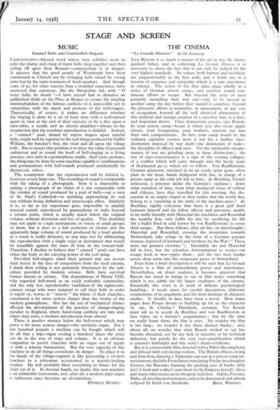THE CINEMA ,6 La Grande Illusion." At the Academy JEAN
RENOIR is as much a master of his art as was his distin- guished father, and in criticising La Grande Illusion it is necessary to stress the fact that it can only be judged by the very highest standards. Its values, both human and technical, are unquestionably in the first rank, and it holds one in a tension of suspense and sympathy which is a rare experience in cinema. The action of the film takes place chiefly in a series of German prison camps, and revolves round con- tinuous efforts to escape. But beyond the story of men patiently tunnelling their way out—only to be moved to another camp the day before their tunnel is complete, beyond the phrenetic efforts at normality, at amusement, at any sort of occupation, beyond all the well observed phenomena of this artificial and strange creation of a senseless war, is a basic and important theme. Class distinctions persist, says Renoir. In your prison camp—locate it where you like—your upper classes, your bourgeoisie, your workers, separate out into their own compartments. In fact, your camp would be the ordinary capitalist cosmos were it not for a further class- distinction imposed by war itself—the distinction of rank— the discipline of officers and men. Yet the intolerable circum- stances of war are grinding away at these distinctions ; the rise of class-consciousness is a sign of the coming collapse, of a conflict which will carry through into the hectic years of ill-planned peace which are to follow. Von Rauffenstein, German aristocrat, smashed in an air crash, spine gone, silver plate in the head, hands disfigured with fire, in charge of a prison camp as the only job left to him ; de Boeldieu, French aristocrat, a prisoner under the German's vigilance ; down what corridors of time, from what mediaeval vistas of schloss and château, have they travelled for this meeting, this dis- cussion in an empty chapel as they realise that the world they belong to is vanishing in the rattle of the machine-guns ? de Boeldieu, rigidly conscious that there is a great gulf fixed between himself and his fellow officers and prisoners, unable to be really friendly with Marechal the machinist and Rosenthal the wealthy Jew, only fulfils his fate by sacrificing his life (by a bullet fired in cold horror by von Rauffenstein) to cover their escape. But there follows, after all this, an afterthought ; Marechal and Rosenthal, crossing the mountains towards Switzerland, take refuge in the farm of a German peasant woman, deprived of husband and brothers by the War (" Those were our greatest victories "). Inevitably she and Marechal fall in love, but the relentless determination to escape—an escape back to war—parts them ; and the two men trudge across deep snow into the temporary peace of Switzerland.
Even from a brief description it will be seen that La Grande Illusion is a film of extraordinary power and importance. Nevertheless, on closer analysis, it becomes apparent that Renoir has erred in trying to say in film terms something which is too subtle for the larger crudeness of the cinema. Essentially this story is in need of delicate psychological handling ; it needs space for careful description, elaborate restatements of its argument, and the most intimate of character studies. It should, in fact, have been a novel. How many pages does Proust devote to building up for us the character of, say, de Charlus ? Hundreds, certainly. Yet Renoir must ask us to accept de Boeldieu and von Rauffenstein at face value, on a minute's acquaintance ; but by the time we really know them, the film is over. No wonder the film is too long ; no wonder it has three distinct finales ; and, above all, no wonder that what Renoir wished to 'say has become obscured, not by any lack of sincerity or by technical defection, but purely by the very over-simplification which is cinema's birthright and this story's death-certificate.
But it is a memorable film, directed with a Pabst-like simplicity and infused with convincing realism. The British officers, in wig and frou-frou, dancing a Tipperary can-can at a prison-camp en- tertainment, the little Frenchman translating Pindar in a draughty fortress, the Russians burning the packing case of books (why isn't it food and vodka?) sent them by the Empress herself; these and many other scenes are in the great tradition. Gabin, Fresnay, Dalio, all give fine performances, only to be dominated and almost
eclipsed by Erich von Stroheim. BASIL WRIGHT.






































 Previous page
Previous page